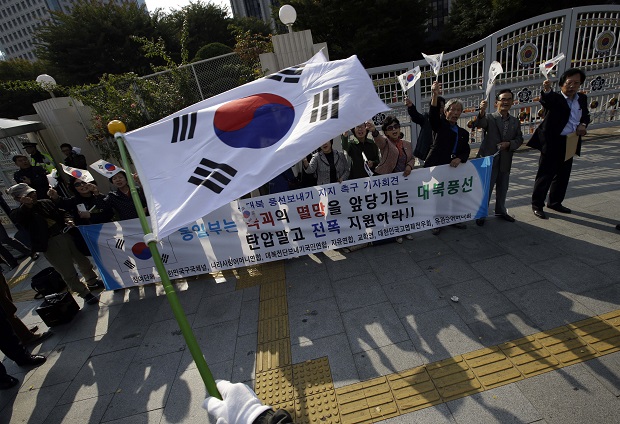Koreas’ military talks end without agreement

South Korean civic group members wave their national flags as they support sending balloons to North Korea, with anti-Pyongyang propaganda leaflets in front of the government complex in Seoul, South Korea, Wednesday, Oct. 15, 2014. AP
SEOUL — The first military talks between North and South Korea in more than three years ended with no agreement Wednesday, with the rivals failing to narrow their differences on how to ease animosities following two shooting incidents last week, South Korean officials said.
The two countries traded gunfire Friday after South Korean activists floated balloons carrying anti-Pyongyang propaganda leaflets across the border. Earlier last week, their navies exchanged warning shots along the nations’ disputed sea boundary. There were no reports of casualties from either incident, but they served as a reminder of tensions running high on the divided Korean Peninsula.
On Wednesday, following a proposal by the North, military generals from the two Koreas met at a border village in the countries’ first military talks since February 2011, according to South Korea’s Defense Ministry.
During the closed-door meeting, North Korea repeated its demands that South Korea ban activists from dropping leaflets and media outlets from publishing articles critical of the North, ministry spokesman Kim Min-seok said at a televised news conference. South Korean delegates responded that they cannot do so because South Korea is a liberal democracy, he said.
The sides were also at odds over the sea boundary, drawn unilaterally by the American-led UN command at the end of the 1950-53 Korean War without the North’s consent, Kim said. There have been several bloody inter-Korean naval skirmishes along the boundary in recent years.
Article continues after this advertisement“The atmosphere of today’s talks was very serious because South and North Korea both have wills to improve ties … but they couldn’t narrow their differences,” Kim said. The two sides didn’t set a date for a next meeting, he added.
Article continues after this advertisementAfter Friday’s gunfire exchange, South Korea said it would sternly deal with any further provocations by North Korea, but stressed that the door for dialogue remained open. North Korea urged South Korea to stop hostile acts such as dropping leaflets if it wants improved ties.
Hopes for better relations were given impetus after a group of high-level North Korean officials made a rare visit to South Korea earlier this month and agreed to resume senior-level talks. South Korea’s Unification Ministry, which is responsible for relations with the North, said Wednesday that it proposed the senior-level talks for Oct. 30. Seoul officials have said the talks would be among government officials, not military officers.
The North Korean delegation Wednesday was led by Kim Yong Chol, a hard-line general believed to have been behind two attacks blamed on North Korea that killed 50 South Koreans in 2010. South Korean delegates reiterated during the meeting that Pyongyang must take responsibility for the attacks, according to South Korea’s Defense Ministry.
It was not immediately known how North Korea responded. South Korean officials refused to provide further details of the talks.
The two Koreas remain in a technical state of war because the Korean War ended with an armistice, not a peace treaty. About 28,500 US troops are deployed in South Korea to deter aggression from North Korea.
RELATED STORY
Rival Koreas hold military talks—reports